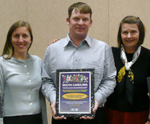|
|

|
Program receives statewide recycling award
|
MUSC’s
Sustainability Program was named the 2008 Outstanding College or
University Waste Reduction and Recycling Program by the S. C.
Department of Health and Environmental Control (DHEC) on March 3.
Criteria for the award included educational efforts by the nominated
program, expansion of the program, and its measured success.
 Representing
the MUSC recycling team are Christine Cooley, from left, sustainability
manager, Jason Metts, recycling coordinator, and Caroline Davila,
communications for sustainability, receive DHEC’s award in recognition
of successful educational efforts and continuing expansion of the
program. Representing
the MUSC recycling team are Christine Cooley, from left, sustainability
manager, Jason Metts, recycling coordinator, and Caroline Davila,
communications for sustainability, receive DHEC’s award in recognition
of successful educational efforts and continuing expansion of the
program.
A division of the Department of Engineering and Facilities, MUSC’s
sustainability team headed by Christine von Kolnitz Cooley, promotes
recycling and energy efficiency to more than 11,000 faculty, staff and
students through multiple venues, including The Catalyst newspaper,
online broadcast messages, bulletin boards, the Internet and
informational presentations throughout the year.
Also a competitor in the national RecycleMania for the past four years,
MUSC has consistently ranked high among colleges and universities.
Year-round, weekly collection of paper, plastic, glass, steel and
aluminum is handled by this team of five full-time staff, one temporary
employee and two part-time helpers. Housekeeping, grounds, maintenance,
surplus and risk management staff provide assistance with daily
collection of cardboard and other essential components for the success
of the program.
“Success of this program has depended upon members of the MUSC
community for choosing to participate, and for actively going out of
their way to find the nearest recycling bin,” said Cooley.
“This year’s winner continues to excel as a community leader. By
partnering with the city, county, local businesses and organizations,
the university has improved waste reduction and recycling awareness.
Recyclables collected on campus include paper, aluminum cans, plastic
bottles, cardboard, books, batteries, scrap metal and cell phones.
During the past year, more than 1,300 tons of municipal solid waste was
recycled,” said Tina Lindler, DHEC Office of Solid Waste Reduction and
Recycling. “In addition to providing more than 1,400 locations for
paper collection, this university expanded its shredding service in
2008. In addition to increasing the amount of paper recycled on campus,
the university realized a $200,000 savings by shredding its own paper.”
Friday, March 27, 2009
|
|
|



